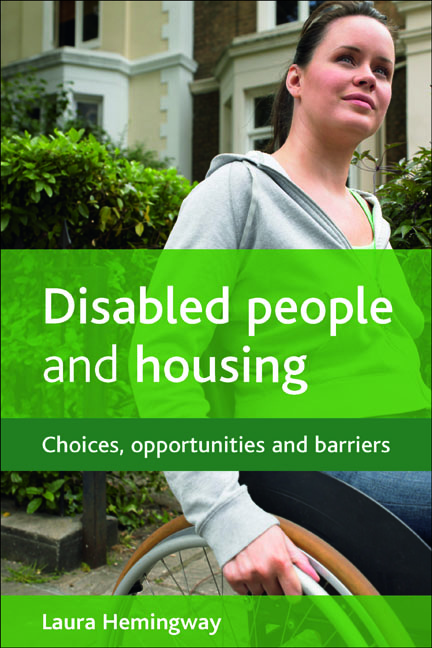Book contents
- Frontmatter
- Dedication
- Contents
- Acknowledgements
- one Introduction
- two Housing policy and disabled people: from past to present
- three Understanding disability: from ‘personal tragedy’ to social disadvantage
- four Physical and communication barriers: the built environment and access to information
- five Financial considerations: income, affordability and risk assessment
- six Attitudinal constraints: assumptions and institutional practices
- seven Creating the ‘home’ in a society of barriers
- References
- Websites
- Index
seven - Creating the ‘home’ in a society of barriers
Published online by Cambridge University Press: 07 September 2022
- Frontmatter
- Dedication
- Contents
- Acknowledgements
- one Introduction
- two Housing policy and disabled people: from past to present
- three Understanding disability: from ‘personal tragedy’ to social disadvantage
- four Physical and communication barriers: the built environment and access to information
- five Financial considerations: income, affordability and risk assessment
- six Attitudinal constraints: assumptions and institutional practices
- seven Creating the ‘home’ in a society of barriers
- References
- Websites
- Index
Summary
The holistic nature of the disability and housing relationship has often been overlooked in favour of prioritising physical matters, but this book has drawn attention to the many interlocking and overlapping variables that affect disabled people's housing choices and opportunities. As we have seen, UK governments have acknowledged aspects of the housing problems facing disabled people, but there is much work still to be done. While some of these issues, such as financial constraints, may be shared by other low-income groups, there are various physical and attitudinal barriers that are distinctive to disabled people. There are also some groups who experience particular disadvantage. This chapter takes a look at some of the themes addressed throughout the book and summarises key messages, beginning with an overview of what the social approach to disability has shown us about choices, opportunities and barriers within housing for disabled people. It then examines the impact that factors discussed in earlier chapters (relating to inaccessible environments, labour market positions and attitudinal constraints) can have on a person's sense of ‘home’. It shows how these factors affect disabled people not just in terms of housing choices, opportunities and pathways, but also in terms of their experiences of housing or meanings of home. Finally, it summarises key issues to provide an accessible overview for practitioners, policymakers and researchers within the housing and disability fields.
Disabled people's access to housing: a social model perspective
The emergence of the social model of disability during the 1970s and 1980s was a crucial development in disabled people's lives, and although subject to critique over recent years, it arguably remains an extremely important tool with which to assess the social exclusion of disabled people. It is hoped that this book has made evident the significance of the social model in the case of housing, demonstrating the ways in which systematic processes and perspectives affect disabled people's housing opportunities, and how barriers arise within important decision-making contexts.
- Type
- Chapter
- Information
- Disabled People and HousingChoices, Opportunities and Barriers, pp. 157 - 176Publisher: Bristol University PressPrint publication year: 2011



